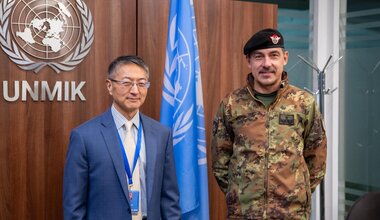4 Dec
2010
SRSG Lamberto Zannier talks to Politika about the upcoming Pristina-Belgrade talks

At the previous meeting of the UN Security Council you complained that Albanian media campaign against UNMIK. How in Pristina is being perceived the recent announcement that UNMIK will participate in Belgrade – Pristine dialogue?
There is no new recent announcement regarding UNMIK's role in the dialogue beyond the statement by the UN Secretary General that the UN stands ready to support the EU in its facilitation of the dialogue between Belgrade and Pristina. In fact, the UN believes that this dialogue will provide an important opportunity to move towards the resolution of a number of important issues affecting the daily life of all people living in Kosovo. So far, this statement did not provoke particular reactions by the media in Pristina.
UNMIK, as opposed to EULEX as technical mission, kept the political role. How this role looks alike today in Kosovo?
Yes, it is true, UNMIK's role has become over time increasingly political. One of our functions is to provide status neutral facilitation to avoid crises, through engagement with the communities and the local institutions, and to provide a practical interface to avoid that disputes about the larger political problems result in practical problems in every day's people's lives in Kosovo. An example of that is the facilitation that we provide to allow for a full interaction of the Kosovo institutions with regional and broader cooperation efforts, without which Kosovo could face exclusion and marginalisation, with the risk that this may undermine regional cooperation efforts.
You offered to participate in the preparation of dialogue, in particular how your role may look alike and what that help could be consisted of?
Formally, I have been appointed by the UN Secretary General, in an exchange of letters with the EU High Representative Ashton, as the UN focal point for the dialogue, together with the Head of the UN Office in Belgrade, Andrew Gilmour. Accordingly, we are pointing out to the EU issues where we believe, from our perspective, that dialogue would be needed to overcome current obstacles. Of course, it will be for the parties themselves, assisted by the EU as the key facilitator, to agree on the agenda and the format of the talks.
Whether you will participate in discussions on customs and justice?
Rule of law in Kosovo is a competency that has been largely transferred to the Kosovo institutions, while the responsibilities still pertaining to the international community under UNSCR 1244 - including certain executive functions - have been taken over by EULEX since December 2008. Of course, we are liaising with EULEX - and, more broadly, with the EU - in this regard, and will be reporting on progress to the Security Council, but we regard these issues as being increasingly dealt with from a European perspective.
What do you think about the proposal of the President of Zvecan municipality, to form special investigative regional unit for North that would solve incidents, since they have no confidence in the institutions in Pristina?
I have raised this with EULEX. Progress on important but sensitive issues such as this can only take place on the basis of consultations with all relevant stakeholders.
What is your view of the fact that in North the opening of polling stations for elections in public institutions will not be allowed?
I do not believe that it is necessary to blow out of proportion the issue of the location of the polling stations. What is important is to ensure that there is no obstacle in principle to the operation of the polling stations, so as not to impede the exercise of the right of vote by those residents of all Kosovo municipalities that may choose to do so.
You have recently emphasized the importance of ensuring that, despite the refusal of Pristina to talk about it, a solution for northern Kosovo has to be found. How much are you willing to help in that area?
I will continue engaging with all sides in this regard, explaining my concerns and sharing my ideas. I believe that it is important for us to contribute to work towards a viable solution - leading to longer term security, stability and prosperity - also for northern Kosovo. In fact, I remain concerned for the lingering potential of instability in that area.
Serbs in areas where they are majority want greater presence of UNMIK, is it feasible?
I would like to reassure you on this point. Certainly, we intend to continue engaging with all communities in Kosovo, including the Serbian communities, as a key part of our mandate. UNMIK field monitoring teams are in contact with community leaders on a daily basis. The current role and shape of UNMIK is the result of a compromise found in the Security Council, where there was agreement on a larger role of the EU under UNSCR 1244. Together with EULEX, KFOR, the OSCE, the Council of Europe, UN agencies and other international organisations present in Kosovo, we intend to continue providing support to these communities but will also continue working towards reconciliation and multiethnicity in the institutions, which is the only sustainable solution in the long term, allowing for progress in returns and the rebuilding of a society that has been so dramatically affected by the conflict.
 UN
UN United Nations Peacekeeping
United Nations Peacekeeping





